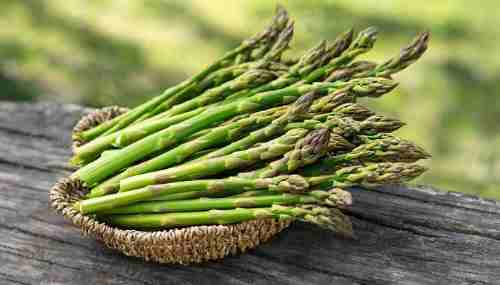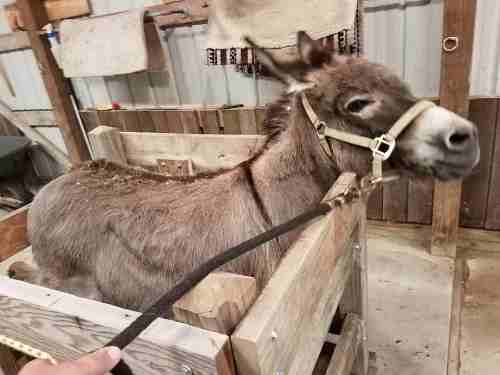Asparagus, a perennial herbaceous plant, is renowned for its pointed spears and pointed tips that are scaled. They are found in all regions of the globe; however, China, Germany, Peru, and the US are the primary producers. The low-calorie food is high in fiber, folate, and vitamins K, A, and C. It aids digestion, reduces blood pressure, encourages weight loss, and guarantees the healthiest pregnancy. These plants that live long can be harvested within three years of making seed, and they can live for up to 15 years.
Donkeys love food. The addition of fruits and vegetables to the donkeys’ diet can provide variety and boost a healthy appetite. But donkeys also have specific nutritional requirements.
We know that it’s safe and healthy for us; is it safe for animals as well? What is the case with horses?
Since this article is about horses, let’s look at whether it’s suitable for them and the advantages and disadvantages of feeding the food to horses.
Can horses take asparagus? They can take in. But it’s best then not to feed them. It’s just that it’s nutritious. It’s healthy; however, your horse is likely to be unable to digest it. Choose a different alternative.
Donkeys Eating Fruits
They are susceptible to obesity and can cause hyperlipidemia, which is a potentially fatal disease for them. Based on a limited amount of snacks, a well-planned and planned feeding schedule for your donkey is the ideal way to show your affection.
The good thing is that there are plenty of fruits and veggies that you can feed your donkeys to bring some variety and excitement for them.
If you buy any of these vegetables and fruits, ensure that they are fresh and free of mold and cut into small pieces like sticks to prevent choking.
These treats should be limited to a small portion (one or two pieces) daily.
In their natural environment, donkeys browse through the grasslands, eating fibrous vegetation in tiny amounts during their day. In the summer and spring, the donkeys of The Donkey Sanctuary have access to grazing in a restricted area. Apart from the limited grazing, our donkeys have access to barley straw to ensure enough fiber for their nutritional requirements. What amount of grass that donkeys are allowed to access can be controlled by strip grazing with electric fencing or by co-grazing with different species to stop them from becoming overweight.
How do we provide Asparagus to Horses?

The most secure method of feeding asparagus raw is to gather the young parts and cut them into bite-sized chunks. This reduces the chance of indigestion and choking. Some horse owners believe that boiling asparagus for horses is healthy. I’m not sure about that.
Avoid feeding horses asparagus.
Its stalks can be pretty difficult to chew and digest. This is the reason we prefer eating them whole cooked. Vitamins and minerals will only be taken into the body of a mammal if the vegetable or fruit is eaten raw. Banking and cooking reduce the benefits. It’s not safe to eat raw, so it’s best to leave it alone in the case of horses or other animals.
Fruits Donkeys Love
Apples
Donkeys are fond of apples. Apples are rich in fiber and vitamin C. A medium-sized apple contains 95 calories, 1 gram of fat, and 3 grams of fiber.
They also contain 19 grams of sugar that are naturally occurring and 25g of carbs (source). They’re a healthy snack to feed your donkeys.
Fresh apples are ideal for donkeys. They can be fed to them in pieces or freshly grated. Do not eat cooked or dried apples.
In rare instances, apple puree may be added to feed to entice the eater to be more tolerant or a donkey who has lost appetite (source).
Bananas
Bananas are an additional fruit that is loved by donkeys. They are high in potassium and are also a good source of vitamin B6 and magnesium, fiber, vitamin C, and manganese (source).
These essential minerals (namely magnesium and potassium) are a crucial part of a healthy diet for donkeys.
Additionally, there is you don’t need to cut the peel off! The banana peel is safe for donkeys, and they enjoy eating this fruit (source).
Plants that can be toxic to Donkeys
Beneficial Health Effects from Celery for Donkeys

Being a member of the Apiaceae Apiaceae group, celery belongs to the same category as parsnips and carrots. It is well-known to humans as a healthy snack; donkeys could benefit from it as well. It’s not just because it’s cool and refreshing during the summer heat.
As per Medical News Today, celery offers a wealth of nutritional benefits:
Apigenin is a pigment that plants have reported in a study from 2016 to stimulate apoptosis of damaged cells and thus decrease the risk of developing cancer in animals and humans.
Apigenin is also believed to be beneficial for the brain. It could also enhance your donkey’s cognition.
Fiber: The high fiber levels found in celery make it an excellent food for the digestive system. Some studies show fiber may aid in regulating blood pressure as well.
Antioxidants: Celery is known for its water-rich and antioxidant levels, particularly in the form of compounds like selinene and limonene. This helps donkeys fight off illnesses and remain healthy.
Foods and vegetables to avoid
While there is plenty of fruit and vegetables that donkeys can eat without fear, there are a few that should be avoided since they pose a risk to donkeys.
Unsafe vegetables:
Brassica family members The brassica family includes brussels sprouts, kale broccoli, kale, and cauliflower.
Vegetables of the family nightshade include tomatoes, potatoes, peppers, aubergines, and leeks, onions, and garlic.
Other stone fruits
Straw
We suggest giving donkeys quality barley straw because it is rich in fiber and low in sugar and closely resembles foods that donkeys consume when in nature. The constant access to straw lets a donkey consume a large amount of food without taking in excessive calories. A high intake of calories increases the opportunity for donkeys could gain extra weight and is associated with the dangers of developing health problems like hyperlipaemia or laminitis. Oat straw can be beneficial for overweight donkeys or old ones because it has a higher nutritional quality than barley straw. The straw of wheat is exceptionally flexible, and it has fewer energy levels; however, it can be fed to healthy young donkeys with healthy teeth. Linseed straw should be avoided because the seeds are poisonous to donkeys unless cooked, and it’s complicated to determine if there are no seeds within the straw. If the straw is scarce, priority should be given to it being used for feed, and other bedding options such as shavings must be utilized.
Silage
Hay isn’t suited for donkeys to eat because the moisture level is typically too high and has a low pH, low fiber level, and elevated protein levels.
High fiber pellets
There are numerous brands available that offer high-fiber pellets. The products targeted at horses susceptible to laminitis make a great option because they’re usually rich in fiber and less sugar-laden. The high-fiber shells can be an excellent option if you require more than hay, grass, and straw to help increase the weight of an older or overweight donkey. It is essential to ensure that the donkey doesn’t devour the pellets in a hurry because it could cause colic. Therefore, add water and mix in the smallest amount of low-sugar chaff before you introduce shots for the very first time. The high fiber pellets can be washed to a mash. This is especially beneficial for donkeys with weak teeth. Beware of projectiles that contain cereal grains since they are not suitable for feeding donkeys. The products advertised as “mixes” generally include cereal grains and are not eligible for donkeys.
Turnips
Turnips are part of the cruciferous family together with kale, broccoli, brussels sprouts, and cauliflower.
While turnips are safe for donkeys to eat, other cruciferous vegetables aren’t. Check out the section below for a list of fruit and vegetables to stay clear of.
The turnips are a nutritious vegetable with very few calories, making them an excellent treat for donkeys.
One cup of chopped turnips contains only 36 calories. They are an excellent food source for vitamin C as well as Vitamin K (source).
Pineapples
The sweet, juicy, and juicy pineapples: donkeys love it, But are they safe? The answer is yes; this fruit is safe for donkeys to consume as an indulgence.
According to the Donkey Sanctuary located in Manchester, This is a trendy treat for their donkeys.
Cut the pineapple into tiny triangles. No need to peel the skin off; donkeys love to enjoy it!
General concerns
- All feed products should be of good quality.
- All horses are susceptible to toxins discovered in feeds that are rotten.
- All feed products must be free of mold.
- Any changes to their diet should be done gradually and over at least 7-14 days.
- Donkeys are more likely to search for their bulk and fiber throughout the day.
- Donkeys like to eat small portions and frequently. Could you give them a straw of aid-lib barley?
- Don’t feed too much to your donkey. Check the health of the body of your donkey regularly.
- Donkeys don’t require excessive amounts of sugar in their diets.
- If you have any doubts regarding the energy content or quality or the quality of any food item, it’s recommended to consult a professional.
- Always ensure a balancer or mineral lick, and always have access to a safe water source.
Don’t feed grass clippings. Also, make sure that your neighbors know about the risks of doing so because it could cause colic.
Summary
- Donkeys can enjoy celery as well as various other plant-based meals.
- Donkeys should not be fed vegetables from the brassica family since they can be poisonous.
- Donkeys consume grass, hay, and various other plants in the wild. They benefit from minerals, vitamins, and fiber
I hope this article will convince you that feeding your donkeys celery will not cause them to harm over the long term. It’s a delicious snack with many health benefits for them too.
Conclusion
In the case of nutrition for donkeys, small portions of straw, grass, and occasionally treats from hay are most helpful. But, while this distinction might not be significant to you, donkeys and horses differ significantly in their nutritional requirements. Donkeys love to graze all day long, but they’ll eat anything at their site and, if you are taking care of donkeys, ensure that they are eating a balanced diet. To avoid these problems, Donkeys are frequently given a high amount of sugar, resulting in weight increase and sugar cane which is fattening. Additionally, they gain weight quickly or in excess when surrounded by the lush pastures or the midst of hay. The donkey’s diet is based on a range of data provided by SPANA to assist you in becoming more informed about the best food choices for your donkeys.